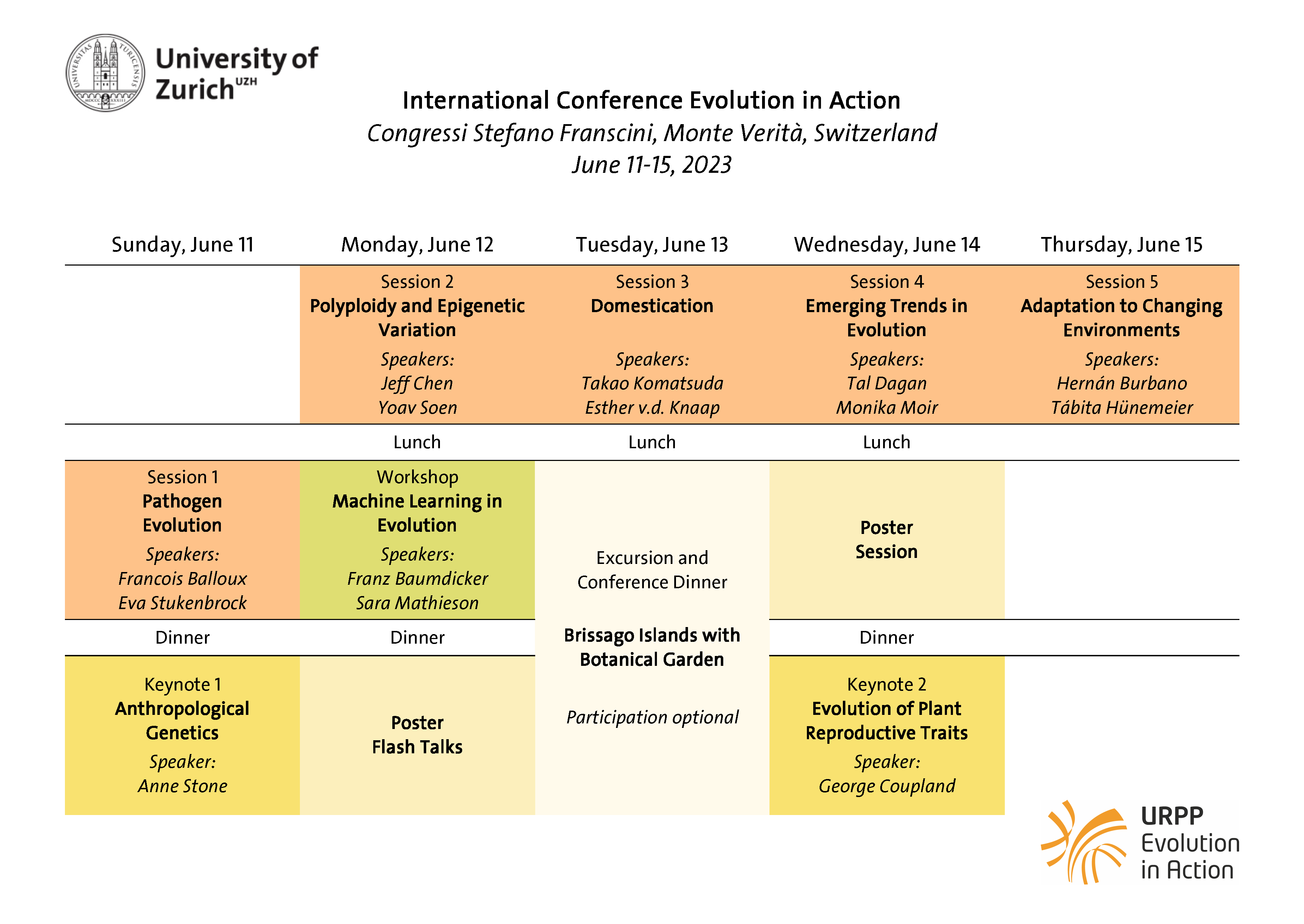Navigation auf uzh.ch
Navigation auf uzh.ch

Anthropological Genetics Anne Stone
Evolution of Plant Reproductive TraitsGeorge Coupland
Chairs: Beat Keller, Verena Schünemann
Speakers: Francois Balloux, Eva Stukenbrock
The co-evolution of pathogens and their hosts provides a unique opportunity to study mechanisms of adaptation and diversification in evolution. Many co-evolutionary events in host–pathogen interactions occur within very short time frames, i.e. within a few years or at least a few hundred years, and therefore represent excellent opportunities to study “evolution in action”. Both pathogen evolution and host adaptation are topics for this session.
Chairs: Ueli Grossniklaus, Kentaro Shimizu
Speakers: Jeff Chen, Yoav Soen
Epigenetic variation can arise quickly and thus there has been a debate on its role in rapid evolution. Novel genome-wide epigenetic variation is often observed in experimentally-induced polyploids and is hypothesized to facilitate rapid polyploid speciation. We invite contributions broadly related to polyploidy or epigenetic variation.
Chairs: Simon Aeschbacher, Kentaro Shimizu
Speakers: Takao Komatsuda, Esther van der Knaap
As a major cultural innovation in human history, domestication facilitated the transition from hunting and gathering to pastoralism and sedentary agriculture. Together with experimental evolution, domestication processes provide unique opportunities to study rapid and ongoing evolution. For this session, we welcome contributions that trace, model, or predict (co-)evolutionary change in domesticated plants or animals, wild relatives, and humans. We also invite contributions that present novel approaches to crop and animal breeding showing potential to address the challenges of biodiversity loss, global change, and food security.
Chairs: Chiara Barbieri, Verena Schünemann
Speakers: Tal Dagan, Monika Moir
Evolutionary themes are extending to different domains, as science itself "evolves" with fruitful cross disciplinary contaminations. This session will cover different trends in evolutionary biology which are currently in a hot spot because of innovative approaches and timely applications, and topics not represented in the other sessions.
Chairs: Chiara Barbieri, Beat Keller
Speakers: Hernán Burbano, Tábita Hünemeier
How does selection act on genomic plasticity? From extreme environments to changing ecological settings, through exposure to new pathogens, a species can show different degrees of adaptation. This session focuses on the challenges posed by diverse environments, with new niches of adaptation, and on how species respond to them. Our range of cases include human cultural adaptations, and the interaction between humans and domesticates.
Host: Simon Aeschbacher
Speakers: Franz Baumdicker, Sara Mathieson
From dimension reduction via principal component analysis and inference of data structure via clustering to much more involved techniques including random forests and neural networks: machine learning (ML) has profoundly affected the way evolutionary biologists extract information from data and make predictions. Given the magic of computers, how important are the biological know-how and intuition of the scientist who uses ML? Two practice-oriented talks by leading experts will review the history of ML, present cutting-edge applications, and provide perspectives on the future potential and limitations of ML in evolutionary biology.
The Brissago Islands date back to the Roman time (vestiges of that time have been found on the islands) but became particularly famous thanks to the fascinating Russian Baroness Antoinette de Saint Léger who owned the Islands (1885-1927) and launched an intense cultural activity. At the same time, she started what has become a unique botanical garden in Switzerland (today the property of the Canton Ticino), with 1500 plant species both indigenous and from sub-tropical zones.
The Conference Dinner was part of the excursion and took place at the Ristorante Isole di Brissago (Villa Emden).
